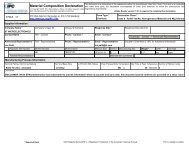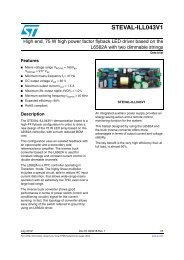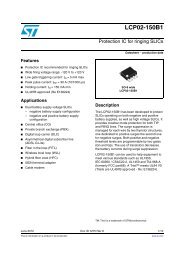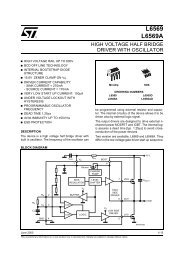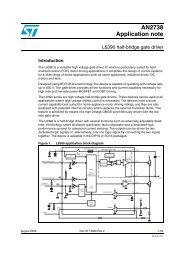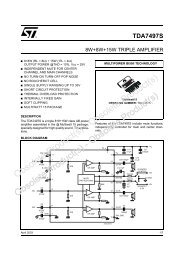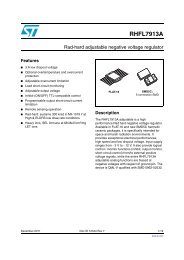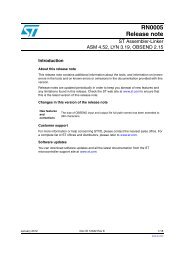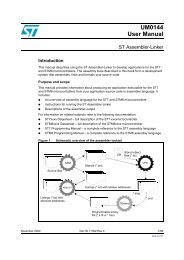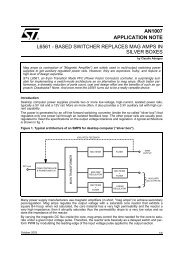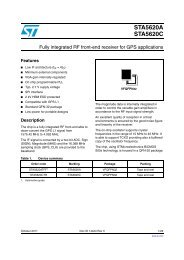- Page 1 and 2:
RM0090 Reference manual STM32F40x,
- Page 3 and 4:
Contents RM0090 3.5.3 Erase . . . .
- Page 5 and 6:
Contents RM0090 6.3.1 RCC clock con
- Page 7 and 8:
Contents RM0090 7.4.7 GPIO port bit
- Page 9 and 10:
Contents RM0090 10.3.4 Falling trig
- Page 11 and 12:
Contents RM0090 12.4.2 Independent
- Page 13 and 14:
Contents RM0090 14.3.3 Repetition c
- Page 15 and 16:
Contents RM0090 15.4.12 TIMx auto-r
- Page 17 and 18:
Contents RM0090 17.4.6 TIM6&TIM7 co
- Page 19 and 20:
Contents RM0090 22.1 HASH introduct
- Page 21 and 22:
Contents RM0090 24.3.3 Tx mailboxes
- Page 23 and 24:
Contents RM0090 26.3.14 Hardware fl
- Page 25 and 26:
Contents RM0090 28.4.13 SD I/O mode
- Page 27 and 28:
Contents RM0090 29.7 Ethernet inter
- Page 29 and 30:
Contents RM0090 31.3.1 High-speed O
- Page 31 and 32:
Contents RM0090 33.2 Reference ARM
- Page 33 and 34:
List of tables RM0090 List of table
- Page 35 and 36:
List of tables RM0090 Table 98. Tra
- Page 37 and 38:
List of tables RM0090 Table 192. NO
- Page 39 and 40:
List of figures RM0090 Figure 49. A
- Page 41 and 42:
List of figures RM0090 Figure 151.
- Page 43 and 44:
List of figures RM0090 Figure 251.
- Page 45 and 46:
List of figures RM0090 Figure 349.
- Page 47 and 48:
Documentation conventions RM0090 1
- Page 49 and 50:
Memory and bus architecture RM0090
- Page 51 and 52:
Memory and bus architecture RM0090
- Page 53 and 54:
Memory and bus architecture RM0090
- Page 55 and 56:
Memory and bus architecture RM0090
- Page 57 and 58:
Memory and bus architecture RM0090
- Page 59 and 60:
Memory and bus architecture RM0090
- Page 61 and 62:
Embedded Flash memory interface RM0
- Page 63 and 64:
Embedded Flash memory interface RM0
- Page 65 and 66:
Embedded Flash memory interface RM0
- Page 67 and 68:
Embedded Flash memory interface RM0
- Page 69 and 70:
Embedded Flash memory interface RM0
- Page 71 and 72:
Embedded Flash memory interface RM0
- Page 73 and 74:
Embedded Flash memory interface RM0
- Page 75 and 76:
Embedded Flash memory interface RM0
- Page 77 and 78:
Embedded Flash memory interface RM0
- Page 79 and 80:
Embedded Flash memory interface RM0
- Page 81 and 82:
Embedded Flash memory interface RM0
- Page 83 and 84:
Embedded Flash memory interface RM0
- Page 85 and 86:
Embedded Flash memory interface RM0
- Page 87 and 88:
CRC calculation unit RM0090 4 CRC c
- Page 89 and 90:
CRC calculation unit RM0090 Bits 7:
- Page 91 and 92:
Power control (PWR) RM0090 Figure 7
- Page 93 and 94:
Power control (PWR) RM0090 When the
- Page 95 and 96:
Power control (PWR) RM0090 mode (se
- Page 97 and 98:
Power control (PWR) RM0090 A PVDO f
- Page 99 and 100:
Power control (PWR) RM0090 5.3.3 Sl
- Page 101 and 102:
Power control (PWR) RM0090 If an ac
- Page 103 and 104:
Power control (PWR) RM0090 I/O stat
- Page 105 and 106:
Power control (PWR) RM0090 Safe RTC
- Page 107 and 108:
Power control (PWR) RM0090 Bit 4 PV
- Page 109 and 110:
Power control (PWR) RM0090 5.4.3 PW
- Page 111 and 112:
Reset and clock control for (RCC) R
- Page 113 and 114:
Reset and clock control for (RCC) R
- Page 115 and 116:
Reset and clock control for (RCC) R
- Page 117 and 118:
Reset and clock control for (RCC) R
- Page 119 and 120:
Reset and clock control for (RCC) R
- Page 121 and 122:
Reset and clock control for (RCC) R
- Page 123 and 124:
Reset and clock control for (RCC) R
- Page 125 and 126:
Reset and clock control for (RCC) R
- Page 127 and 128:
Reset and clock control for (RCC) R
- Page 129 and 130:
Reset and clock control for (RCC) R
- Page 131 and 132:
Reset and clock control for (RCC) R
- Page 133 and 134:
Reset and clock control for (RCC) R
- Page 135 and 136:
Reset and clock control for (RCC) R
- Page 137 and 138:
Reset and clock control for (RCC) R
- Page 139 and 140:
Reset and clock control for (RCC) R
- Page 141 and 142:
Reset and clock control for (RCC) R
- Page 143 and 144:
Reset and clock control for (RCC) R
- Page 145 and 146:
Reset and clock control for (RCC) R
- Page 147 and 148:
Reset and clock control for (RCC) R
- Page 149 and 150:
Reset and clock control for (RCC) R
- Page 151 and 152:
Reset and clock control for (RCC) R
- Page 153 and 154:
Reset and clock control for (RCC) R
- Page 155 and 156:
Reset and clock control for (RCC) R
- Page 157 and 158:
Reset and clock control for (RCC) R
- Page 159 and 160:
Reset and clock control for (RCC) R
- Page 161 and 162:
Reset and clock control for (RCC) R
- Page 163 and 164:
Reset and clock control for (RCC) R
- Page 165 and 166:
Reset and clock control for (RCC) R
- Page 167 and 168:
Reset and clock control for (RCC) R
- Page 169 and 170:
Reset and clock control for (RCC) R
- Page 171 and 172:
Reset and clock control for (RCC) R
- Page 173 and 174:
Reset and clock control for (RCC) R
- Page 175 and 176:
Reset and clock control for (RCC) R
- Page 177 and 178:
Reset and clock control for (RCC) R
- Page 179 and 180:
Reset and clock control for (RCC) R
- Page 181 and 182:
Reset and clock control for (RCC) R
- Page 183 and 184:
Reset and clock control for (RCC) R
- Page 185 and 186:
General-purpose I/Os (GPIO) RM0090
- Page 187 and 188:
General-purpose I/Os (GPIO) RM0090
- Page 189 and 190:
General-purpose I/Os (GPIO) RM0090
- Page 191 and 192:
General-purpose I/Os (GPIO) RM0090
- Page 193 and 194:
General-purpose I/Os (GPIO) RM0090
- Page 195 and 196:
General-purpose I/Os (GPIO) RM0090
- Page 197 and 198:
General-purpose I/Os (GPIO) RM0090
- Page 199 and 200:
General-purpose I/Os (GPIO) RM0090
- Page 201 and 202:
General-purpose I/Os (GPIO) RM0090
- Page 203 and 204:
General-purpose I/Os (GPIO) RM0090
- Page 205 and 206:
System configuration controller (SY
- Page 207 and 208:
System configuration controller (SY
- Page 209 and 210:
System configuration controller (SY
- Page 211 and 212:
DMA controller (DMA) RM0090 9 DMA c
- Page 213 and 214:
DMA controller (DMA) RM0090 9.3 DMA
- Page 215 and 216:
DMA controller (DMA) RM0090 Figure
- Page 217 and 218:
DMA controller (DMA) RM0090 Table 3
- Page 219 and 220:
DMA controller (DMA) RM0090 In dire
- Page 221 and 222:
DMA controller (DMA) RM0090 Figure
- Page 223 and 224:
DMA controller (DMA) RM0090 memory
- Page 225 and 226:
DMA controller (DMA) RM0090 9.3.11
- Page 227 and 228:
DMA controller (DMA) RM0090 Table 3
- Page 229 and 230:
DMA controller (DMA) RM0090 9.3.14
- Page 231 and 232:
DMA controller (DMA) RM0090 9.3.17
- Page 233 and 234:
DMA controller (DMA) RM0090 9.4 DMA
- Page 235 and 236:
DMA controller (DMA) RM0090 Bits 25
- Page 237 and 238:
DMA controller (DMA) RM0090 9.5.5 D
- Page 239 and 240:
DMA controller (DMA) RM0090 Bits 8
- Page 241 and 242:
DMA controller (DMA) RM0090 15 14 1
- Page 243 and 244:
DMA controller (DMA) RM0090 9.5.11
- Page 245 and 246:
DMA controller (DMA) RM0090 Table 4
- Page 247 and 248:
Interrupts and events RM0090 10 Int
- Page 249 and 250:
Interrupts and events RM0090 Table
- Page 251 and 252:
Interrupts and events RM0090 Table
- Page 253 and 254:
Interrupts and events RM0090 Table
- Page 255 and 256:
Interrupts and events RM0090 Table
- Page 257 and 258:
Interrupts and events RM0090 genera
- Page 259 and 260:
Interrupts and events RM0090 10.3 E
- Page 261 and 262:
Interrupts and events RM0090 15 14
- Page 263 and 264:
Analog-to-digital converter (ADC) R
- Page 265 and 266:
Analog-to-digital converter (ADC) R
- Page 267 and 268:
Analog-to-digital converter (ADC) R
- Page 269 and 270:
Analog-to-digital converter (ADC) R
- Page 271 and 272:
Analog-to-digital converter (ADC) R
- Page 273 and 274:
Analog-to-digital converter (ADC) R
- Page 275 and 276:
Analog-to-digital converter (ADC) R
- Page 277 and 278:
Analog-to-digital converter (ADC) R
- Page 279 and 280:
Analog-to-digital converter (ADC) R
- Page 281 and 282:
Analog-to-digital converter (ADC) R
- Page 283 and 284:
Analog-to-digital converter (ADC) R
- Page 285 and 286:
Analog-to-digital converter (ADC) R
- Page 287 and 288:
Analog-to-digital converter (ADC) R
- Page 289 and 290:
Analog-to-digital converter (ADC) R
- Page 291 and 292:
Analog-to-digital converter (ADC) R
- Page 293 and 294:
Analog-to-digital converter (ADC) R
- Page 295 and 296:
Analog-to-digital converter (ADC) R
- Page 297 and 298:
Analog-to-digital converter (ADC) R
- Page 299 and 300:
Analog-to-digital converter (ADC) R
- Page 301 and 302:
Analog-to-digital converter (ADC) R
- Page 303 and 304:
Analog-to-digital converter (ADC) R
- Page 305 and 306:
Analog-to-digital converter (ADC) R
- Page 307 and 308:
Digital-to-analog converter (DAC) R
- Page 309 and 310:
Digital-to-analog converter (DAC) R
- Page 311 and 312:
Digital-to-analog converter (DAC) R
- Page 313 and 314:
Digital-to-analog converter (DAC) R
- Page 315 and 316:
Digital-to-analog converter (DAC) R
- Page 317 and 318:
Digital-to-analog converter (DAC) R
- Page 319 and 320:
Digital-to-analog converter (DAC) R
- Page 321 and 322:
Digital-to-analog converter (DAC) R
- Page 323 and 324:
Digital-to-analog converter (DAC) R
- Page 325 and 326:
Digital-to-analog converter (DAC) R
- Page 327 and 328:
Digital camera interface (DCMI) RM0
- Page 329 and 330:
Digital camera interface (DCMI) RM0
- Page 331 and 332:
Digital camera interface (DCMI) RM0
- Page 333 and 334:
Digital camera interface (DCMI) RM0
- Page 335 and 336:
Digital camera interface (DCMI) RM0
- Page 337 and 338:
Digital camera interface (DCMI) RM0
- Page 339 and 340:
Digital camera interface (DCMI) RM0
- Page 341 and 342:
Digital camera interface (DCMI) RM0
- Page 343 and 344:
Digital camera interface (DCMI) RM0
- Page 345 and 346:
Digital camera interface (DCMI) RM0
- Page 347 and 348:
Digital camera interface (DCMI) RM0
- Page 349 and 350:
Advanced-control timers (TIM1&TIM8)
- Page 351 and 352:
Advanced-control timers (TIM1&TIM8)
- Page 353 and 354:
Advanced-control timers (TIM1&TIM8)
- Page 355 and 356:
Advanced-control timers (TIM1&TIM8)
- Page 357 and 358:
Advanced-control timers (TIM1&TIM8)
- Page 359 and 360:
Advanced-control timers (TIM1&TIM8)
- Page 361 and 362:
Advanced-control timers (TIM1&TIM8)
- Page 363 and 364:
Advanced-control timers (TIM1&TIM8)
- Page 365 and 366:
Advanced-control timers (TIM1&TIM8)
- Page 367 and 368:
Advanced-control timers (TIM1&TIM8)
- Page 369 and 370:
Advanced-control timers (TIM1&TIM8)
- Page 371 and 372:
Advanced-control timers (TIM1&TIM8)
- Page 373 and 374:
Advanced-control timers (TIM1&TIM8)
- Page 375 and 376:
Advanced-control timers (TIM1&TIM8)
- Page 377 and 378:
Advanced-control timers (TIM1&TIM8)
- Page 379 and 380:
Advanced-control timers (TIM1&TIM8)
- Page 381 and 382:
Advanced-control timers (TIM1&TIM8)
- Page 383 and 384:
Advanced-control timers (TIM1&TIM8)
- Page 385 and 386:
Advanced-control timers (TIM1&TIM8)
- Page 387 and 388:
Advanced-control timers (TIM1&TIM8)
- Page 389 and 390:
Advanced-control timers (TIM1&TIM8)
- Page 391 and 392:
Advanced-control timers (TIM1&TIM8)
- Page 393 and 394:
Advanced-control timers (TIM1&TIM8)
- Page 395 and 396:
Advanced-control timers (TIM1&TIM8)
- Page 397 and 398:
Advanced-control timers (TIM1&TIM8)
- Page 399 and 400:
Advanced-control timers (TIM1&TIM8)
- Page 401 and 402:
Advanced-control timers (TIM1&TIM8)
- Page 403 and 404:
Advanced-control timers (TIM1&TIM8)
- Page 405 and 406:
Advanced-control timers (TIM1&TIM8)
- Page 407 and 408:
Advanced-control timers (TIM1&TIM8)
- Page 409 and 410:
Advanced-control timers (TIM1&TIM8)
- Page 411 and 412:
Advanced-control timers (TIM1&TIM8)
- Page 413 and 414:
Advanced-control timers (TIM1&TIM8)
- Page 415 and 416:
Advanced-control timers (TIM1&TIM8)
- Page 417 and 418:
Advanced-control timers (TIM1&TIM8)
- Page 419 and 420:
General-purpose timers (TIM2 to TIM
- Page 421 and 422:
General-purpose timers (TIM2 to TIM
- Page 423 and 424:
General-purpose timers (TIM2 to TIM
- Page 425 and 426:
General-purpose timers (TIM2 to TIM
- Page 427 and 428:
General-purpose timers (TIM2 to TIM
- Page 429 and 430:
General-purpose timers (TIM2 to TIM
- Page 431 and 432:
General-purpose timers (TIM2 to TIM
- Page 433 and 434:
General-purpose timers (TIM2 to TIM
- Page 435 and 436:
General-purpose timers (TIM2 to TIM
- Page 437 and 438:
General-purpose timers (TIM2 to TIM
- Page 439 and 440:
General-purpose timers (TIM2 to TIM
- Page 441 and 442:
General-purpose timers (TIM2 to TIM
- Page 443 and 444:
General-purpose timers (TIM2 to TIM
- Page 445 and 446:
General-purpose timers (TIM2 to TIM
- Page 447 and 448:
General-purpose timers (TIM2 to TIM
- Page 449 and 450:
General-purpose timers (TIM2 to TIM
- Page 451 and 452:
General-purpose timers (TIM2 to TIM
- Page 453 and 454:
General-purpose timers (TIM2 to TIM
- Page 455 and 456:
General-purpose timers (TIM2 to TIM
- Page 457 and 458:
General-purpose timers (TIM2 to TIM
- Page 459 and 460:
General-purpose timers (TIM2 to TIM
- Page 461 and 462:
General-purpose timers (TIM2 to TIM
- Page 463 and 464:
General-purpose timers (TIM2 to TIM
- Page 465 and 466:
General-purpose timers (TIM2 to TIM
- Page 467 and 468:
General-purpose timers (TIM2 to TIM
- Page 469 and 470:
General-purpose timers (TIM2 to TIM
- Page 471 and 472:
General-purpose timers (TIM2 to TIM
- Page 473 and 474:
General-purpose timers (TIM2 to TIM
- Page 475 and 476:
General-purpose timers (TIM2 to TIM
- Page 477 and 478:
General-purpose timers (TIM2 to TIM
- Page 479 and 480:
General-purpose timers (TIM9 to TIM
- Page 481 and 482:
General-purpose timers (TIM9 to TIM
- Page 483 and 484:
General-purpose timers (TIM9 to TIM
- Page 485 and 486:
General-purpose timers (TIM9 to TIM
- Page 487 and 488:
General-purpose timers (TIM9 to TIM
- Page 489 and 490:
General-purpose timers (TIM9 to TIM
- Page 491 and 492:
General-purpose timers (TIM9 to TIM
- Page 493 and 494:
General-purpose timers (TIM9 to TIM
- Page 495 and 496:
General-purpose timers (TIM9 to TIM
- Page 497 and 498:
General-purpose timers (TIM9 to TIM
- Page 499 and 500:
General-purpose timers (TIM9 to TIM
- Page 501 and 502:
General-purpose timers (TIM9 to TIM
- Page 503 and 504:
General-purpose timers (TIM9 to TIM
- Page 505 and 506:
General-purpose timers (TIM9 to TIM
- Page 507 and 508:
General-purpose timers (TIM9 to TIM
- Page 509 and 510:
General-purpose timers (TIM9 to TIM
- Page 511 and 512:
General-purpose timers (TIM9 to TIM
- Page 513 and 514:
General-purpose timers (TIM9 to TIM
- Page 515 and 516:
General-purpose timers (TIM9 to TIM
- Page 517 and 518:
General-purpose timers (TIM9 to TIM
- Page 519 and 520:
General-purpose timers (TIM9 to TIM
- Page 521 and 522:
Basic timers (TIM6&TIM7) RM0090 17
- Page 523 and 524:
Basic timers (TIM6&TIM7) RM0090 Fig
- Page 525 and 526:
Basic timers (TIM6&TIM7) RM0090 Fig
- Page 527 and 528:
Basic timers (TIM6&TIM7) RM0090 17.
- Page 529 and 530:
Basic timers (TIM6&TIM7) RM0090 17.
- Page 531 and 532:
Basic timers (TIM6&TIM7) RM0090 17.
- Page 533 and 534:
Independent watchdog (IWDG) RM0090
- Page 535 and 536:
Independent watchdog (IWDG) RM0090
- Page 537 and 538:
Window watchdog (WWDG) RM0090 19 Wi
- Page 539 and 540:
Window watchdog (WWDG) RM0090 case,
- Page 541 and 542:
Window watchdog (WWDG) RM0090 19.6
- Page 543 and 544:
Window watchdog (WWDG) RM0090 19.6.
- Page 545 and 546:
Cryptographic processor (CRYP) RM00
- Page 547 and 548:
Cryptographic processor (CRYP) RM00
- Page 549 and 550:
Cryptographic processor (CRYP) RM00
- Page 551 and 552:
Cryptographic processor (CRYP) RM00
- Page 553 and 554:
Cryptographic processor (CRYP) RM00
- Page 555 and 556:
Cryptographic processor (CRYP) RM00
- Page 557 and 558:
Cryptographic processor (CRYP) RM00
- Page 559 and 560:
Cryptographic processor (CRYP) RM00
- Page 561 and 562:
Cryptographic processor (CRYP) RM00
- Page 563 and 564:
Cryptographic processor (CRYP) RM00
- Page 565 and 566:
Cryptographic processor (CRYP) RM00
- Page 567 and 568:
Cryptographic processor (CRYP) RM00
- Page 569 and 570:
Cryptographic processor (CRYP) RM00
- Page 571 and 572:
Cryptographic processor (CRYP) RM00
- Page 573 and 574:
Cryptographic processor (CRYP) RM00
- Page 575 and 576:
Cryptographic processor (CRYP) RM00
- Page 577 and 578:
Cryptographic processor (CRYP) RM00
- Page 579 and 580:
Cryptographic processor (CRYP) RM00
- Page 581 and 582:
Cryptographic processor (CRYP) RM00
- Page 583 and 584:
Cryptographic processor (CRYP) RM00
- Page 585 and 586:
Cryptographic processor (CRYP) RM00
- Page 587 and 588:
Cryptographic processor (CRYP) RM00
- Page 589 and 590:
Random number generator (RNG) RM009
- Page 591 and 592:
Random number generator (RNG) RM009
- Page 593 and 594:
Random number generator (RNG) RM009
- Page 595 and 596:
Hash processor (HASH) RM0090 22.3 H
- Page 597 and 598:
Hash processor (HASH) RM0090 has le
- Page 599 and 600:
Hash processor (HASH) RM0090 The le
- Page 601 and 602:
Hash processor (HASH) RM0090 with v
- Page 603 and 604:
Hash processor (HASH) RM0090 Proced
- Page 605 and 606:
Hash processor (HASH) RM0090 Bit 12
- Page 607 and 608:
Hash processor (HASH) RM0090 22.4.2
- Page 609 and 610:
Hash processor (HASH) RM0090 Bit 3
- Page 611 and 612:
Hash processor (HASH) RM0090 22.4.4
- Page 613 and 614:
Hash processor (HASH) RM0090 HASH_H
- Page 615 and 616:
Hash processor (HASH) RM0090 22.4.7
- Page 617 and 618:
Hash processor (HASH) RM0090 22.4.9
- Page 619 and 620:
Hash processor (HASH) RM0090 Table
- Page 621 and 622:
Real-time clock (RTC) RM0090 23.2 R
- Page 623 and 624:
Real-time clock (RTC) RM0090 The as
- Page 625 and 626:
Real-time clock (RTC) RM0090 23.3.5
- Page 627 and 628:
Real-time clock (RTC) RM0090 RTC_TR
- Page 629 and 630:
Real-time clock (RTC) RM0090 window
- Page 631 and 632:
Real-time clock (RTC) RM0090 The fo
- Page 633 and 634:
Real-time clock (RTC) RM0090 Sectio
- Page 635 and 636:
Real-time clock (RTC) RM0090 23.3.1
- Page 637 and 638:
Real-time clock (RTC) RM0090 23.6 R
- Page 639 and 640:
Real-time clock (RTC) RM0090 23.6.3
- Page 641 and 642:
Real-time clock (RTC) RM0090 Bit 3
- Page 643 and 644:
Real-time clock (RTC) RM0090 Bit 4
- Page 645 and 646:
Real-time clock (RTC) RM0090 23.6.7
- Page 647 and 648:
Real-time clock (RTC) RM0090 23.6.9
- Page 649 and 650:
Real-time clock (RTC) RM0090 23.6.1
- Page 651 and 652:
Real-time clock (RTC) RM0090 23.6.1
- Page 653 and 654:
Real-time clock (RTC) RM0090 23.6.1
- Page 655 and 656:
Real-time clock (RTC) RM0090 Bit 0
- Page 657 and 658:
Real-time clock (RTC) RM0090 23.6.2
- Page 659 and 660:
Controller area network (bxCAN) RM0
- Page 661 and 662:
Controller area network (bxCAN) RM0
- Page 663 and 664:
Controller area network (bxCAN) RM0
- Page 665 and 666:
Controller area network (bxCAN) RM0
- Page 667 and 668:
Controller area network (bxCAN) RM0
- Page 669 and 670:
Controller area network (bxCAN) RM0
- Page 671 and 672:
Controller area network (bxCAN) RM0
- Page 673 and 674:
Controller area network (bxCAN) RM0
- Page 675 and 676:
Controller area network (bxCAN) RM0
- Page 677 and 678:
Controller area network (bxCAN) RM0
- Page 679 and 680:
Controller area network (bxCAN) RM0
- Page 681 and 682:
Controller area network (bxCAN) RM0
- Page 683 and 684:
Controller area network (bxCAN) RM0
- Page 685 and 686:
Controller area network (bxCAN) RM0
- Page 687 and 688:
Controller area network (bxCAN) RM0
- Page 689 and 690:
Controller area network (bxCAN) RM0
- Page 691 and 692:
Controller area network (bxCAN) RM0
- Page 693 and 694:
Controller area network (bxCAN) RM0
- Page 695 and 696:
Controller area network (bxCAN) RM0
- Page 697 and 698:
Controller area network (bxCAN) RM0
- Page 699 and 700:
Controller area network (bxCAN) RM0
- Page 701 and 702:
Controller area network (bxCAN) RM0
- Page 703 and 704:
Inter-integrated circuit (I 2 C) in
- Page 705 and 706:
Inter-integrated circuit (I 2 C) in
- Page 707 and 708:
Inter-integrated circuit (I 2 C) in
- Page 709 and 710:
Inter-integrated circuit (I 2 C) in
- Page 711 and 712:
Inter-integrated circuit (I 2 C) in
- Page 713 and 714:
Inter-integrated circuit (I 2 C) in
- Page 715 and 716:
Inter-integrated circuit (I 2 C) in
- Page 717 and 718:
Inter-integrated circuit (I 2 C) in
- Page 719 and 720:
Inter-integrated circuit (I 2 C) in
- Page 721 and 722:
Inter-integrated circuit (I 2 C) in
- Page 723 and 724:
Inter-integrated circuit (I 2 C) in
- Page 725 and 726:
Inter-integrated circuit (I 2 C) in
- Page 727 and 728:
Inter-integrated circuit (I 2 C) in
- Page 729 and 730:
Inter-integrated circuit (I 2 C) in
- Page 731 and 732:
Inter-integrated circuit (I 2 C) in
- Page 733 and 734:
Inter-integrated circuit (I 2 C) in
- Page 735 and 736:
Inter-integrated circuit (I 2 C) in
- Page 737 and 738:
Inter-integrated circuit (I 2 C) in
- Page 739 and 740:
Universal synchronous asynchronous
- Page 741 and 742:
Universal synchronous asynchronous
- Page 743 and 744:
Universal synchronous asynchronous
- Page 745 and 746:
Universal synchronous asynchronous
- Page 747 and 748:
Universal synchronous asynchronous
- Page 749 and 750:
Universal synchronous asynchronous
- Page 751 and 752:
Universal synchronous asynchronous
- Page 753 and 754:
Universal synchronous asynchronous
- Page 755 and 756:
Universal synchronous asynchronous
- Page 757 and 758:
Universal synchronous asynchronous
- Page 759 and 760:
Universal synchronous asynchronous
- Page 761 and 762:
Universal synchronous asynchronous
- Page 763 and 764:
Universal synchronous asynchronous
- Page 765 and 766:
Universal synchronous asynchronous
- Page 767 and 768:
Universal synchronous asynchronous
- Page 769 and 770:
Universal synchronous asynchronous
- Page 771 and 772:
Universal synchronous asynchronous
- Page 773 and 774:
Universal synchronous asynchronous
- Page 775 and 776:
Universal synchronous asynchronous
- Page 777 and 778:
Universal synchronous asynchronous
- Page 779 and 780:
Universal synchronous asynchronous
- Page 781 and 782:
Universal synchronous asynchronous
- Page 783 and 784:
Universal synchronous asynchronous
- Page 785 and 786:
Universal synchronous asynchronous
- Page 787 and 788:
Universal synchronous asynchronous
- Page 789 and 790:
Universal synchronous asynchronous
- Page 791 and 792:
Serial peripheral interface (SPI) R
- Page 793 and 794:
Serial peripheral interface (SPI) R
- Page 795 and 796:
Serial peripheral interface (SPI) R
- Page 797 and 798:
Serial peripheral interface (SPI) R
- Page 799 and 800:
Serial peripheral interface (SPI) R
- Page 801 and 802:
Serial peripheral interface (SPI) R
- Page 803 and 804:
Serial peripheral interface (SPI) R
- Page 805 and 806:
Serial peripheral interface (SPI) R
- Page 807 and 808:
Serial peripheral interface (SPI) R
- Page 809 and 810:
Serial peripheral interface (SPI) R
- Page 811 and 812:
Serial peripheral interface (SPI) R
- Page 813 and 814:
Serial peripheral interface (SPI) R
- Page 815 and 816:
Serial peripheral interface (SPI) R
- Page 817 and 818:
Serial peripheral interface (SPI) R
- Page 819 and 820:
Serial peripheral interface (SPI) R
- Page 821 and 822:
Serial peripheral interface (SPI) R
- Page 823 and 824:
Serial peripheral interface (SPI) R
- Page 825 and 826:
Serial peripheral interface (SPI) R
- Page 827 and 828:
Serial peripheral interface (SPI) R
- Page 829 and 830:
Serial peripheral interface (SPI) R
- Page 831 and 832:
Serial peripheral interface (SPI) R
- Page 833 and 834:
Serial peripheral interface (SPI) R
- Page 835 and 836:
Serial peripheral interface (SPI) R
- Page 837 and 838:
Serial peripheral interface (SPI) R
- Page 839 and 840:
Serial peripheral interface (SPI) R
- Page 841 and 842:
Serial peripheral interface (SPI) R
- Page 843 and 844:
Secure digital input/output interfa
- Page 845 and 846:
Secure digital input/output interfa
- Page 847 and 848:
Secure digital input/output interfa
- Page 849 and 850:
Secure digital input/output interfa
- Page 851 and 852:
Secure digital input/output interfa
- Page 853 and 854:
Secure digital input/output interfa
- Page 855 and 856:
Secure digital input/output interfa
- Page 857 and 858:
Secure digital input/output interfa
- Page 859 and 860:
Secure digital input/output interfa
- Page 861 and 862:
Secure digital input/output interfa
- Page 863 and 864:
Secure digital input/output interfa
- Page 865 and 866:
Secure digital input/output interfa
- Page 867 and 868:
Secure digital input/output interfa
- Page 869 and 870:
Secure digital input/output interfa
- Page 871 and 872:
Secure digital input/output interfa
- Page 873 and 874:
Secure digital input/output interfa
- Page 875 and 876:
Secure digital input/output interfa
- Page 877 and 878:
Secure digital input/output interfa
- Page 879 and 880:
Secure digital input/output interfa
- Page 881 and 882:
Secure digital input/output interfa
- Page 883 and 884:
Secure digital input/output interfa
- Page 885 and 886:
Secure digital input/output interfa
- Page 887 and 888:
Secure digital input/output interfa
- Page 889 and 890:
Secure digital input/output interfa
- Page 891 and 892:
Secure digital input/output interfa
- Page 893 and 894:
Secure digital input/output interfa
- Page 895 and 896:
Secure digital input/output interfa
- Page 897 and 898:
Secure digital input/output interfa
- Page 899 and 900:
Ethernet (ETH): media access contro
- Page 901 and 902:
Ethernet (ETH): media access contro
- Page 903 and 904:
Ethernet (ETH): media access contro
- Page 905 and 906:
Ethernet (ETH): media access contro
- Page 907 and 908:
Ethernet (ETH): media access contro
- Page 909 and 910:
Ethernet (ETH): media access contro
- Page 911 and 912:
Ethernet (ETH): media access contro
- Page 913 and 914:
Ethernet (ETH): media access contro
- Page 915 and 916:
Ethernet (ETH): media access contro
- Page 917 and 918:
Ethernet (ETH): media access contro
- Page 919 and 920:
Ethernet (ETH): media access contro
- Page 921 and 922:
Ethernet (ETH): media access contro
- Page 923 and 924:
Ethernet (ETH): media access contro
- Page 925 and 926:
Ethernet (ETH): media access contro
- Page 927 and 928:
Ethernet (ETH): media access contro
- Page 929 and 930:
Ethernet (ETH): media access contro
- Page 931 and 932:
Ethernet (ETH): media access contro
- Page 933 and 934:
Ethernet (ETH): media access contro
- Page 935 and 936:
Ethernet (ETH): media access contro
- Page 937 and 938:
Ethernet (ETH): media access contro
- Page 939 and 940:
Ethernet (ETH): media access contro
- Page 941 and 942:
Ethernet (ETH): media access contro
- Page 943 and 944:
Ethernet (ETH): media access contro
- Page 945 and 946:
Ethernet (ETH): media access contro
- Page 947 and 948:
Ethernet (ETH): media access contro
- Page 949 and 950:
Ethernet (ETH): media access contro
- Page 951 and 952:
Ethernet (ETH): media access contro
- Page 953 and 954:
Ethernet (ETH): media access contro
- Page 955 and 956:
Ethernet (ETH): media access contro
- Page 957 and 958:
Ethernet (ETH): media access contro
- Page 959 and 960:
Ethernet (ETH): media access contro
- Page 961 and 962:
Ethernet (ETH): media access contro
- Page 963 and 964:
Ethernet (ETH): media access contro
- Page 965 and 966:
Ethernet (ETH): media access contro
- Page 967 and 968:
Ethernet (ETH): media access contro
- Page 969 and 970:
Ethernet (ETH): media access contro
- Page 971 and 972:
Ethernet (ETH): media access contro
- Page 973 and 974:
Ethernet (ETH): media access contro
- Page 975 and 976:
Ethernet (ETH): media access contro
- Page 977 and 978:
Ethernet (ETH): media access contro
- Page 979 and 980:
Ethernet (ETH): media access contro
- Page 981 and 982:
Ethernet (ETH): media access contro
- Page 983 and 984:
Ethernet (ETH): media access contro
- Page 985 and 986:
Ethernet (ETH): media access contro
- Page 987 and 988:
Ethernet (ETH): media access contro
- Page 989 and 990:
Ethernet (ETH): media access contro
- Page 991 and 992:
Ethernet (ETH): media access contro
- Page 993 and 994:
Ethernet (ETH): media access contro
- Page 995 and 996:
Ethernet (ETH): media access contro
- Page 997 and 998:
Ethernet (ETH): media access contro
- Page 999 and 1000:
Ethernet (ETH): media access contro
- Page 1001 and 1002:
Ethernet (ETH): media access contro
- Page 1003 and 1004: Ethernet (ETH): media access contro
- Page 1005 and 1006: Ethernet (ETH): media access contro
- Page 1007 and 1008: Ethernet (ETH): media access contro
- Page 1009 and 1010: Ethernet (ETH): media access contro
- Page 1011 and 1012: Ethernet (ETH): media access contro
- Page 1013 and 1014: Ethernet (ETH): media access contro
- Page 1015 and 1016: Ethernet (ETH): media access contro
- Page 1017 and 1018: USB on-the-go full-speed (OTG_FS) R
- Page 1019 and 1020: USB on-the-go full-speed (OTG_FS) R
- Page 1021 and 1022: USB on-the-go full-speed (OTG_FS) R
- Page 1023 and 1024: USB on-the-go full-speed (OTG_FS) R
- Page 1025 and 1026: USB on-the-go full-speed (OTG_FS) R
- Page 1027 and 1028: USB on-the-go full-speed (OTG_FS) R
- Page 1029 and 1030: USB on-the-go full-speed (OTG_FS) R
- Page 1031 and 1032: USB on-the-go full-speed (OTG_FS) R
- Page 1033 and 1034: USB on-the-go full-speed (OTG_FS) R
- Page 1035 and 1036: USB on-the-go full-speed (OTG_FS) R
- Page 1037 and 1038: USB on-the-go full-speed (OTG_FS) R
- Page 1039 and 1040: USB on-the-go full-speed (OTG_FS) R
- Page 1041 and 1042: USB on-the-go full-speed (OTG_FS) R
- Page 1043 and 1044: USB on-the-go full-speed (OTG_FS) R
- Page 1045 and 1046: USB on-the-go full-speed (OTG_FS) R
- Page 1047 and 1048: USB on-the-go full-speed (OTG_FS) R
- Page 1049 and 1050: USB on-the-go full-speed (OTG_FS) R
- Page 1051 and 1052: USB on-the-go full-speed (OTG_FS) R
- Page 1053: USB on-the-go full-speed (OTG_FS) R
- Page 1057 and 1058: USB on-the-go full-speed (OTG_FS) R
- Page 1059 and 1060: USB on-the-go full-speed (OTG_FS) R
- Page 1061 and 1062: USB on-the-go full-speed (OTG_FS) R
- Page 1063 and 1064: USB on-the-go full-speed (OTG_FS) R
- Page 1065 and 1066: USB on-the-go full-speed (OTG_FS) R
- Page 1067 and 1068: USB on-the-go full-speed (OTG_FS) R
- Page 1069 and 1070: USB on-the-go full-speed (OTG_FS) R
- Page 1071 and 1072: USB on-the-go full-speed (OTG_FS) R
- Page 1073 and 1074: USB on-the-go full-speed (OTG_FS) R
- Page 1075 and 1076: USB on-the-go full-speed (OTG_FS) R
- Page 1077 and 1078: USB on-the-go full-speed (OTG_FS) R
- Page 1079 and 1080: USB on-the-go full-speed (OTG_FS) R
- Page 1081 and 1082: USB on-the-go full-speed (OTG_FS) R
- Page 1083 and 1084: USB on-the-go full-speed (OTG_FS) R
- Page 1085 and 1086: USB on-the-go full-speed (OTG_FS) R
- Page 1087 and 1088: USB on-the-go full-speed (OTG_FS) R
- Page 1089 and 1090: USB on-the-go full-speed (OTG_FS) R
- Page 1091 and 1092: USB on-the-go full-speed (OTG_FS) R
- Page 1093 and 1094: USB on-the-go full-speed (OTG_FS) R
- Page 1095 and 1096: USB on-the-go full-speed (OTG_FS) R
- Page 1097 and 1098: USB on-the-go full-speed (OTG_FS) R
- Page 1099 and 1100: USB on-the-go full-speed (OTG_FS) R
- Page 1101 and 1102: USB on-the-go full-speed (OTG_FS) R
- Page 1103 and 1104: USB on-the-go full-speed (OTG_FS) R
- Page 1105 and 1106:
USB on-the-go full-speed (OTG_FS) R
- Page 1107 and 1108:
USB on-the-go full-speed (OTG_FS) R
- Page 1109 and 1110:
USB on-the-go full-speed (OTG_FS) R
- Page 1111 and 1112:
USB on-the-go full-speed (OTG_FS) R
- Page 1113 and 1114:
USB on-the-go full-speed (OTG_FS) R
- Page 1115 and 1116:
USB on-the-go full-speed (OTG_FS) R
- Page 1117 and 1118:
USB on-the-go full-speed (OTG_FS) R
- Page 1119 and 1120:
USB on-the-go full-speed (OTG_FS) R
- Page 1121 and 1122:
USB on-the-go full-speed (OTG_FS) R
- Page 1123 and 1124:
USB on-the-go full-speed (OTG_FS) R
- Page 1125 and 1126:
USB on-the-go full-speed (OTG_FS) R
- Page 1127 and 1128:
USB on-the-go full-speed (OTG_FS) R
- Page 1129 and 1130:
USB on-the-go full-speed (OTG_FS) R
- Page 1131 and 1132:
USB on-the-go full-speed (OTG_FS) R
- Page 1133 and 1134:
USB on-the-go full-speed (OTG_FS) R
- Page 1135 and 1136:
USB on-the-go full-speed (OTG_FS) R
- Page 1137 and 1138:
USB on-the-go full-speed (OTG_FS) R
- Page 1139 and 1140:
USB on-the-go full-speed (OTG_FS) R
- Page 1141 and 1142:
USB on-the-go full-speed (OTG_FS) R
- Page 1143 and 1144:
USB on-the-go full-speed (OTG_FS) R
- Page 1145 and 1146:
USB on-the-go full-speed (OTG_FS) R
- Page 1147 and 1148:
USB on-the-go full-speed (OTG_FS) R
- Page 1149 and 1150:
USB on-the-go full-speed (OTG_FS) R
- Page 1151 and 1152:
USB on-the-go full-speed (OTG_FS) R
- Page 1153 and 1154:
USB on-the-go full-speed (OTG_FS) R
- Page 1155 and 1156:
USB on-the-go high-speed (OTG_HS) R
- Page 1157 and 1158:
USB on-the-go high-speed (OTG_HS) R
- Page 1159 and 1160:
USB on-the-go high-speed (OTG_HS) R
- Page 1161 and 1162:
USB on-the-go high-speed (OTG_HS) R
- Page 1163 and 1164:
USB on-the-go high-speed (OTG_HS) R
- Page 1165 and 1166:
USB on-the-go high-speed (OTG_HS) R
- Page 1167 and 1168:
USB on-the-go high-speed (OTG_HS) R
- Page 1169 and 1170:
USB on-the-go high-speed (OTG_HS) R
- Page 1171 and 1172:
USB on-the-go high-speed (OTG_HS) R
- Page 1173 and 1174:
USB on-the-go high-speed (OTG_HS) R
- Page 1175 and 1176:
USB on-the-go high-speed (OTG_HS) R
- Page 1177 and 1178:
USB on-the-go high-speed (OTG_HS) R
- Page 1179 and 1180:
USB on-the-go high-speed (OTG_HS) R
- Page 1181 and 1182:
USB on-the-go high-speed (OTG_HS) R
- Page 1183 and 1184:
USB on-the-go high-speed (OTG_HS) R
- Page 1185 and 1186:
USB on-the-go high-speed (OTG_HS) R
- Page 1187 and 1188:
USB on-the-go high-speed (OTG_HS) R
- Page 1189 and 1190:
USB on-the-go high-speed (OTG_HS) R
- Page 1191 and 1192:
USB on-the-go high-speed (OTG_HS) R
- Page 1193 and 1194:
USB on-the-go high-speed (OTG_HS) R
- Page 1195 and 1196:
USB on-the-go high-speed (OTG_HS) R
- Page 1197 and 1198:
USB on-the-go high-speed (OTG_HS) R
- Page 1199 and 1200:
USB on-the-go high-speed (OTG_HS) R
- Page 1201 and 1202:
USB on-the-go high-speed (OTG_HS) R
- Page 1203 and 1204:
USB on-the-go high-speed (OTG_HS) R
- Page 1205 and 1206:
USB on-the-go high-speed (OTG_HS) R
- Page 1207 and 1208:
USB on-the-go high-speed (OTG_HS) R
- Page 1209 and 1210:
USB on-the-go high-speed (OTG_HS) R
- Page 1211 and 1212:
USB on-the-go high-speed (OTG_HS) R
- Page 1213 and 1214:
USB on-the-go high-speed (OTG_HS) R
- Page 1215 and 1216:
USB on-the-go high-speed (OTG_HS) R
- Page 1217 and 1218:
USB on-the-go high-speed (OTG_HS) R
- Page 1219 and 1220:
USB on-the-go high-speed (OTG_HS) R
- Page 1221 and 1222:
USB on-the-go high-speed (OTG_HS) R
- Page 1223 and 1224:
USB on-the-go high-speed (OTG_HS) R
- Page 1225 and 1226:
USB on-the-go high-speed (OTG_HS) R
- Page 1227 and 1228:
USB on-the-go high-speed (OTG_HS) R
- Page 1229 and 1230:
USB on-the-go high-speed (OTG_HS) R
- Page 1231 and 1232:
USB on-the-go high-speed (OTG_HS) R
- Page 1233 and 1234:
USB on-the-go high-speed (OTG_HS) R
- Page 1235 and 1236:
USB on-the-go high-speed (OTG_HS) R
- Page 1237 and 1238:
USB on-the-go high-speed (OTG_HS) R
- Page 1239 and 1240:
USB on-the-go high-speed (OTG_HS) R
- Page 1241 and 1242:
USB on-the-go high-speed (OTG_HS) R
- Page 1243 and 1244:
USB on-the-go high-speed (OTG_HS) R
- Page 1245 and 1246:
USB on-the-go high-speed (OTG_HS) R
- Page 1247 and 1248:
USB on-the-go high-speed (OTG_HS) R
- Page 1249 and 1250:
USB on-the-go high-speed (OTG_HS) R
- Page 1251 and 1252:
USB on-the-go high-speed (OTG_HS) R
- Page 1253 and 1254:
USB on-the-go high-speed (OTG_HS) R
- Page 1255 and 1256:
USB on-the-go high-speed (OTG_HS) R
- Page 1257 and 1258:
USB on-the-go high-speed (OTG_HS) R
- Page 1259 and 1260:
USB on-the-go high-speed (OTG_HS) R
- Page 1261 and 1262:
USB on-the-go high-speed (OTG_HS) R
- Page 1263 and 1264:
USB on-the-go high-speed (OTG_HS) R
- Page 1265 and 1266:
USB on-the-go high-speed (OTG_HS) R
- Page 1267 and 1268:
USB on-the-go high-speed (OTG_HS) R
- Page 1269 and 1270:
USB on-the-go high-speed (OTG_HS) R
- Page 1271 and 1272:
USB on-the-go high-speed (OTG_HS) R
- Page 1273 and 1274:
USB on-the-go high-speed (OTG_HS) R
- Page 1275 and 1276:
USB on-the-go high-speed (OTG_HS) R
- Page 1277 and 1278:
USB on-the-go high-speed (OTG_HS) R
- Page 1279 and 1280:
USB on-the-go high-speed (OTG_HS) R
- Page 1281 and 1282:
USB on-the-go high-speed (OTG_HS) R
- Page 1283 and 1284:
USB on-the-go high-speed (OTG_HS) R
- Page 1285 and 1286:
USB on-the-go high-speed (OTG_HS) R
- Page 1287 and 1288:
USB on-the-go high-speed (OTG_HS) R
- Page 1289 and 1290:
USB on-the-go high-speed (OTG_HS) R
- Page 1291 and 1292:
USB on-the-go high-speed (OTG_HS) R
- Page 1293 and 1294:
USB on-the-go high-speed (OTG_HS) R
- Page 1295 and 1296:
USB on-the-go high-speed (OTG_HS) R
- Page 1297 and 1298:
USB on-the-go high-speed (OTG_HS) R
- Page 1299 and 1300:
USB on-the-go high-speed (OTG_HS) R
- Page 1301 and 1302:
USB on-the-go high-speed (OTG_HS) R
- Page 1303 and 1304:
USB on-the-go high-speed (OTG_HS) R
- Page 1305 and 1306:
USB on-the-go high-speed (OTG_HS) R
- Page 1307 and 1308:
USB on-the-go high-speed (OTG_HS) R
- Page 1309 and 1310:
USB on-the-go high-speed (OTG_HS) R
- Page 1311 and 1312:
USB on-the-go high-speed (OTG_HS) R
- Page 1313 and 1314:
Flexible static memory controller (
- Page 1315 and 1316:
Flexible static memory controller (
- Page 1317 and 1318:
Flexible static memory controller (
- Page 1319 and 1320:
Flexible static memory controller (
- Page 1321 and 1322:
Flexible static memory controller (
- Page 1323 and 1324:
Flexible static memory controller (
- Page 1325 and 1326:
Flexible static memory controller (
- Page 1327 and 1328:
Flexible static memory controller (
- Page 1329 and 1330:
Flexible static memory controller (
- Page 1331 and 1332:
Flexible static memory controller (
- Page 1333 and 1334:
Flexible static memory controller (
- Page 1335 and 1336:
Flexible static memory controller (
- Page 1337 and 1338:
Flexible static memory controller (
- Page 1339 and 1340:
Flexible static memory controller (
- Page 1341 and 1342:
Flexible static memory controller (
- Page 1343 and 1344:
Flexible static memory controller (
- Page 1345 and 1346:
Flexible static memory controller (
- Page 1347 and 1348:
Flexible static memory controller (
- Page 1349 and 1350:
Flexible static memory controller (
- Page 1351 and 1352:
Flexible static memory controller (
- Page 1353 and 1354:
Flexible static memory controller (
- Page 1355 and 1356:
Flexible static memory controller (
- Page 1357 and 1358:
Flexible static memory controller (
- Page 1359 and 1360:
Flexible static memory controller (
- Page 1361 and 1362:
Flexible static memory controller (
- Page 1363 and 1364:
Flexible static memory controller (
- Page 1365 and 1366:
Flexible static memory controller (
- Page 1367 and 1368:
Debug support (DBG) RM0090 33 Debug
- Page 1369 and 1370:
Debug support (DBG) RM0090 Figure 4
- Page 1371 and 1372:
Debug support (DBG) RM0090 33.4.3 I
- Page 1373 and 1374:
Debug support (DBG) RM0090 Figure 4
- Page 1375 and 1376:
Debug support (DBG) RM0090 Only the
- Page 1377 and 1378:
Debug support (DBG) RM0090 Table 22
- Page 1379 and 1380:
Debug support (DBG) RM0090 Note: No
- Page 1381 and 1382:
Debug support (DBG) RM0090 33.9 AHB
- Page 1383 and 1384:
Debug support (DBG) RM0090 33.11 Ca
- Page 1385 and 1386:
Debug support (DBG) RM0090 For this
- Page 1387 and 1388:
Debug support (DBG) RM0090 33.15.3
- Page 1389 and 1390:
Debug support (DBG) RM0090 31 30 29
- Page 1391 and 1392:
Debug support (DBG) RM0090 Bit 20:1
- Page 1393 and 1394:
Debug support (DBG) RM0090 33.17.2
- Page 1395 and 1396:
Debug support (DBG) RM0090 33.17.4
- Page 1397 and 1398:
Debug support (DBG) RM0090 33.17.9
- Page 1399 and 1400:
Device electronic signature RM0090
- Page 1401 and 1402:
A ADC_CCR . . . . . . . . . . . . .
- Page 1403 and 1404:
DMA_SxM1AR . . . . . . . . . . . .
- Page 1405 and 1406:
HASH_SR . . . . . . . . . . . . . .
- Page 1407 and 1408:
RNG_DR . . . . . . . . . . . . . .
- Page 1409 and 1410:
Revision history RM0090 Revision hi
- Page 1411 and 1412:
Revision history RM0090 Table 238.
- Page 1413 and 1414:
Revision history RM0090 Table 238.
- Page 1415 and 1416:
Revision history RM0090 Table 238.



